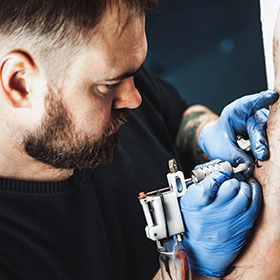No, you cannot sleep during a tattoo. It’s not safe or practical.
Staying awake helps you and the artist. Getting a tattoo is a memorable experience. Many wonder if they can sleep during the process. The idea of dozing off while getting inked might seem tempting, especially for longer sessions. But it’s essential to stay alert and cooperative.
This ensures the tattoo artist can work smoothly and safely. Being awake also allows you to communicate any discomfort or concerns. So, while the thought of sleeping might cross your mind, staying awake is the best choice for a successful tattoo session.
Tattooing Process
Before the tattoo starts, the artist will clean your skin. They may shave the area if needed. A stencil might be used for the design. The artist will explain the process to you. You should make sure to feel calm and ready. Bring snacks and water. Wear comfortable clothes. This can help you relax during the session.
Tattoo sessions can vary in length. Small tattoos may take less than an hour. Large designs can take many hours. Sometimes, big tattoos need multiple sessions. It depends on the size and detail of the tattoo. Talk with your artist about how long it might take. You should be prepared for a long sitting.
Physical Reactions
Falling asleep during a tattoo session might be difficult. The pain and needle vibration usually keep you awake. Some people, though, might feel relaxed enough to doze off.
Pain Levels
Getting a tattoo can cause different pain levels. Some say the pain is like a scratch. Others feel a more intense pain. The pain can depend on where the tattoo is on the body. Bony areas hurt more. Some people have a high pain tolerance. They might feel less pain.
Body’s Response
Your body reacts to the tattoo process. It can release adrenaline. This helps to manage the pain. Your body may also produce endorphins. These can make you feel good. But, they do not remove all the pain. You might feel tired after the tattoo session. This is normal. Your body is working hard.
Sleeping During Tattoo
Sleeping during a tattoo might sound strange. The tattooing process involves needles. Needles puncture the skin. This can cause pain. Many find it hard to sleep during this. Some people might doze off. This is rare, though. Most stay awake.
The size of the tattoo matters. Small tattoos hurt less. Large tattoos take longer. The location also affects pain. Some spots are more sensitive. The tattoo artist’s technique plays a role. A gentle touch helps. Your pain tolerance is key. Higher tolerance means less discomfort.
Tattoo Artist’s Perspective
Tattoo artists usually advise staying awake during the process. Being awake helps you stay still. It also allows you to communicate with the artist. This communication ensures a better result.
Safety is very important during a tattoo session. Sleeping may cause sudden movements. These movements can lead to mistakes or injuries. Staying awake also helps you notice any pain or discomfort. This is crucial for your safety and the quality of the tattoo.
Impact On Tattoo Quality
Staying still helps the artist work better. Moving while getting a tattoo can cause mistakes. Artists need a steady hand to create clean lines. Sleeping might cause you to twitch or move. This can ruin the design. Mistakes are hard to fix. Small movements can lead to big problems. It is best to stay awake and alert.
Ink needs to go deep enough into the skin. If you sleep, your body might relax too much. This can affect how the ink penetrates. The tattoo might not look right. It could fade faster. Staying awake helps ensure the ink goes in properly. Good tattoos need proper ink penetration. It is key for lasting results.
Health Considerations
Sleeping during a tattoo session can be risky. You might move suddenly. This could make the tattoo artist mess up. Mistakes are hard to fix. The needle could slip and cause extra pain. Also, you might not notice if the artist is too deep. This can lead to a bad tattoo or more pain.
Staying awake helps you keep track of hygiene. You can see if the artist uses clean tools. Sleeping might stop you from noticing dirty needles. This can increase the risk of infection. Infections can cause swelling, redness, and pain. Always make sure the area is clean. Stay alert to avoid any health issues.
Tips For Comfort
Use numbing creams to ease the pain. They can make a huge difference. Talk to your artist about pain relief options. They know what works best. Take breaks often. It helps in managing pain and feeling better.
Deep breathing helps in staying calm. Count to three as you breathe in. Then count to three as you breathe out. Listening to music can distract you. Choose something calm and soothing. Some people find podcasts helpful. They keep your mind busy and off the pain.
Post-tattoo Care
Keep your tattoo clean. Gently wash it with mild soap. Pat it dry. Do not rub. Apply a thin layer of ointment. Avoid too much sun. It can hurt the tattoo. Wear loose clothes. This helps the tattoo breathe. Do not scratch or pick at it. This can cause infection.
Healing takes time. In the first days, the tattoo may ooze. This is normal. It will form a scab. Do not pick the scab. Let it fall off naturally. The skin may itch. This means it is healing. Keep it moisturized. Drink water. This helps the skin heal. Watch for signs of infection. Redness, swelling, or pus are bad signs. See a doctor if this happens.
Conclusion
Sleeping during a tattoo session isn’t recommended. It can be risky and uncomfortable. Staying awake helps you communicate with the artist. You can manage pain better and ensure the design is right. Always discuss any concerns with your tattoo artist.
Remember, a tattoo is a permanent piece of art. Your active involvement ensures the best result. Stay alert, stay involved, and enjoy your new tattoo.

